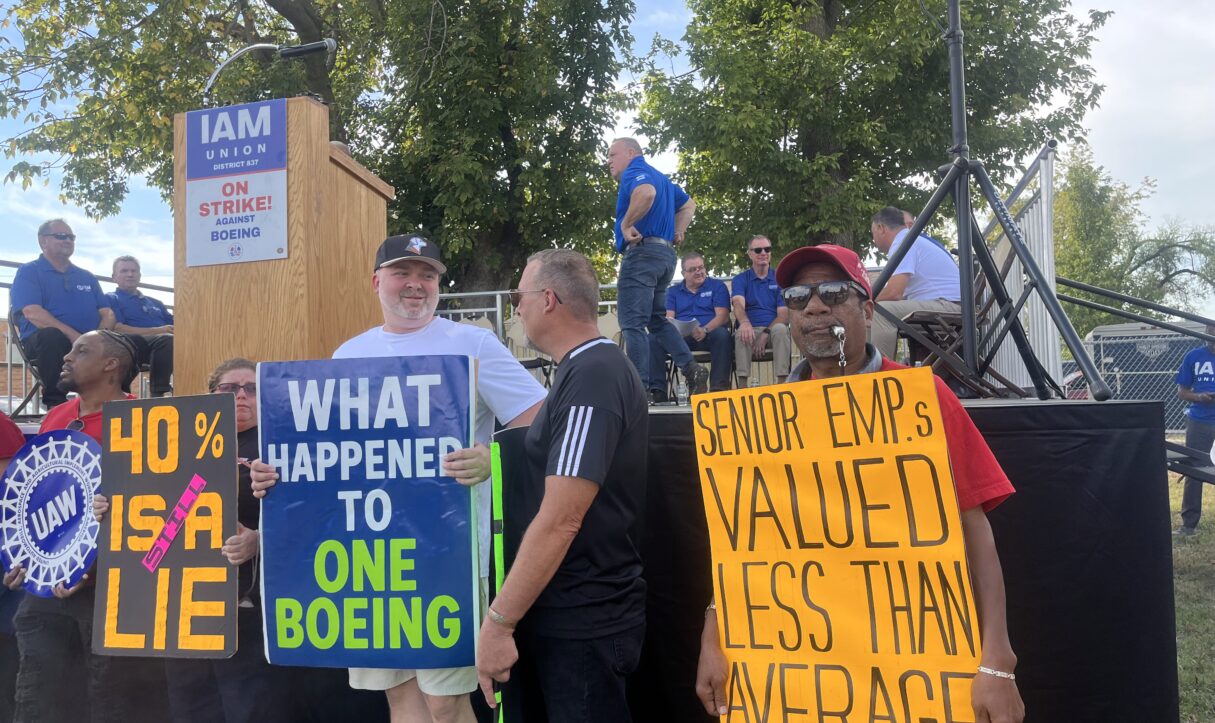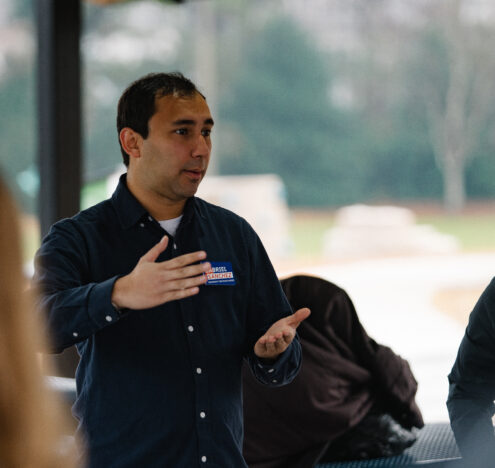Mason, a 20-year-old Boeing machinist, pointed and said,“See that building? That’s where they make the JDAM kits.” The JDAM kit, or Joint Direction Attack Munition, turns unguided bombs into precision-guided bombs. Mason only started working for the company a little over a year ago. Every Monday afternoon, Mason shows up for his picketing shift outside Boeing’s plant in St. Charles, about 20 miles outside St. Louis. Along with three or four other machinists, he sits for four hours with a strike sign, waves at honking cars as they pass, and watches management and nonunion workers — or “scabs,” as the strikers put it — entered and exited the complex. Despite the few strike-breakers showing up to work, Mason said the parking lot was emptier than normal.
The 3,200 members of IAM 827 — mechanics who build Boeing’s F-15s, F-18s, MQ drones, and JDAM guided-missile kits in the St. Louis area — have been on strike since Aug. 4. On Sunday, Oct. 26, the union is set to vote on a company-proposed contract, which adds more pay for top-of-scale employees but decreases attendance additives. Union members have rejected three previous offers, and IAM 837’s bargaining committee has not endorsed this one, either.
For now, workers like Mason are stretching their $300 per week, union-provided strike pay as far as it will go, picking up part-time work, and relying on family support. Mason’s wife has also gone back to work. “We’ve put our kid in daycare at nine months old.”
Even before the strike, Mason explained, his wages weren’t enough to consistently support his wife and young child. He has regularly visited the food bank while working full-time at Boeing. “I couldn’t go to the grocery store like everybody else does. And yet I work at Boeing, one of the most talked-about, greatest companies.”
Others on the picket line said they got jobs at Family Dollar, or at Firehouse Subs, or packing for FedEx or Amazon. Some Boeing machinists, per their last collective bargaining agreement, make as little as $17 an hour. One missile inspector — now driving for Uber — earns a better hourly wage as a rideshare gig-worker than he does at his regular job. Rick Perdue, a 67-year-old sheet metal assembly riveter on the F-15 line, is collecting his Social Security check. He could have retired by now, he said, but stays on strike to support the younger workers in his union.
This is Perdue’s second strike: In 1996, when he was working for McDonnell-Douglas, the military aircraft manufacturer that would later merge with Boeing, he stood in this same spot on the shoulder of State Highway 94. “You just can’t say, ‘I got mine, get yours.’ That’s not right,” Perdue said. “Because I’m a union man from the start to the end.
The union representing Boeing’s Seattle workers, meanwhile, recently donated $32,000 to the IAM-837 strike fund to help them keep going. “At this point, they’re just trying to starve us out,” one F-15 mechanic said while standing on the St. Louis County picket line. The union’s network of food pantries helps some but can’t cover everyone’s needs.
Still, Boeing has felt the heat throughout the strike. For weeks, rumors have circulated among workers that Boeing couldn’t keep up with production demands without them. Those rumors were confirmed Oct. 9, during Air Force Chief of Staff Kenneth S. Wilsbach’s Senate confirmation hearing.
Wilsbach said the F-15 EX program, a 1960s-era jet the military is upgrading to serve as an alternative to the defect-plagued F-35, is experiencing significant delays. Six out of 12 aircraft in a batch that was scheduled for completion this calendar year, he said, are incomplete.
In a text-blast sent to union members, IAM-837 framed this as a victory: “Boeing deliveries are being delayed, and even the Air Force is feeling it. This shows our strength and the power of standing together.”
The union and the company returned to the negotiating table on Oct. 20, shortly after workers filed a federal unfair labor practices claim against Boeing, alleging that the company failed to seriously consider any of the union’s contract proposals. Meanwhile, as the weather gets colder, workers on the picket lines bundle up and huddle around makeshift fire-pits.
The International Association of Machinists has powerful allies: both US Senators Josh Hawley and Bernie Sanders have thrown their weight behind the union, which is the largest at defense contractors in the country, though their numbers have been pummeled in recent years due to union-busting, automation, and company moves to “right-to-work” states, where local laws impede union drives.

The president of the 600,000-strong Machinists union also visited the picket line and blasted Boeing for what he said was underpaying Missouri workers, where wages for maintenance and utility workers start at $17 an hour. “The price of mortgages, the price of rent, has just gone up tremendously, and workers’ wages haven’t kept up with those increases,” President Brian Bryant told Inkstick. “It’s absolutely disgusting when the company says, you know, ‘We’re offering Midwest wages.’ What the hell are Midwest wages?”
But Boeing negotiators continue to reiterate one point: The company, they say, has no more money to offer. On Oct. 9, Boeing Defense, Space, and Security Chief Executive Steve Parker sent a letter to IAM-837 members. “Some may convince you that holding the line will result in more money. It won’t,” Parker wrote, adding later: “This strike is costing you, and more time on the picket line will not result in more money.”
For his part, Jody Bennett, IAM vice president, called that idea “bullshit.” At a rally on Sept. 30, Bennet said, “Last quarter, they made $6 billion in revenue. We go into mediation, and they say, ‘We don’t have any more money.’”
Workers, meanwhile, are well aware that Boeing has tried to hire replacements to take their jobs. Still, they know from experience because training a new assembly mechanic takes months, time might still be on their side. In late September, Boeing held a virtual career fair for mechanics, though they haven’t held any in the St. Louis area where they would work.
Across the street from the St. Louis County picket line, the steel skeleton of the building that will one day house the F-47 next-generation stealth fighter is going up.
“They will not wear us down because they will need us before we need them,” said Breanna Donnell, who has worked at Boeing making F-18 warplane parts since November 2023. “I don’t see engineers going out on the floor and doing our jobs.”
At a rally at Boeing’s North County union hall on Sept. 30, Donnell craned her neck to watch a Boeing fighter fly overhead. “I’m always inside at work, but when I finally get to see the plane flying, that motivates me, that keeps me going.”




















